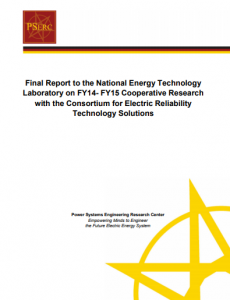Full Title: Final Report to the National Energy Technology Laboratory on FY14- FY15 Cooperative Research with the Consortium for Electric Reliability Technology Solutions
Author(s): Vijay Vittal and Anna Rosa Lampis, Power Systems Engineering Research Center
Publisher(s): The Power System Engineering Research Center
Publication Date: December 1, 2017
Full Text: Download Resource
Description (excerpt):
The Power System Engineering Research Center (PSERC) engages in technological, market, and policy research for an efficient, secure, resilient, adaptable, and economic U.S. electric power system. PSERC, as a founding partner of the Consortium for Electric Reliability Technology Solutions (CERTS), conducted a multi-year program of research for U.S. Department of Energy (DOE) Office of Electricity Delivery and Energy Reliability (OE) to develop new methods, tools, and technologies to protect and enhance the reliability and efficiency of the U.S. electric power system as competitive electricity market structures evolve, and as the grid moves toward wide-scale use of decentralized generation (such as renewable energy sources) and demand-response programs. Phase I of OE’s funding for PSERC, under cooperative agreement DE-FC26-09NT43321, started in fiscal year (FY) 2009 and ended in FY2013. It was administered by DOE’s National Energy Technology Laboratory (NETL) through a cooperative agreement with Arizona State University (ASU). ASU provided sub-awards to the participating PSERC universities. This document is PSERC’s final report to NETL on the activities for OE, conducted through CERTS, from September 2015 through September 2017 utilizing FY 2014 to FY 2015 funding under cooperative agreement DE-OE0000670. PSERC is a thirteen-university consortium with over 30 industry members. Since 1996, PSERC has been engaged in research and education efforts with the mission of “empowering minds to engineer the future electric energy system.” Its work is focused on achieving: • An efficient, secure, resilient, adaptable, and economic electric power infrastructure serving society • A new generation of educated technical professionals in electric power • Knowledgeable decision-makers on critical energy policy issues • Sustained, quality university programs in electric power engineering. PSERC core research is funded by industry, with a budget supporting approximately 30 principal investigators and some 70 graduate students and other researchers. Its researchers are multi-disciplinary, conducting research in three principal areas: power systems, power markets and policy, and transmission and distribution technologies. The research is collaborative; each project involves researchers typically at two universities working with industry advisors who have expressed interest in the project. Examples of topics for recent PSERC research projects include grid integration of renewables and energy storage, new tools for taking advantage of increased penetration of real-time system measurements, advanced system protection methods to maintain grid reliability, and risk and reliability assessment of increasingly complex cyber-enabled power systems. A PSERC’s objective is to proactively address the technical and policy challenges of U.S. electric power systems. To achieve this objective, PSERC works with CERTS to conduct technical research on advanced applications and investigate the design of fair and transparent electricity markets; these research topics align with CERTS research areas 1 and 2: Real-time Grid Reliability Management (Area 1), and Reliability and Markets (Area 2). The CERTS research areas overlap with the PSERC research stems: Power Systems, Power Markets, and Transmission and Distribution Technologies, as described on the PSERC website (see http://www.pserc.org/research/research_program.aspx). The performers were with Arizona State University (ASU), Cornell University (CU), University of California at Berkeley (UCB), and University of Illinois at Urbana-Champaign (UIUC). PSERC research activities in the area of reliability and markets focused on electric market and power policy analyses. The resulting studies suggest ways to frame best practices using organized markets for managing U.S. grid assets reliably and to identify highest priority areas for improvement. PSERC research activities in the area of advanced applications focused on mid- to long-term software research and development, with anticipated outcomes that move innovative ideas toward real-world application. Under the CERTS research area of Real-time Grid Reliability Management, PSERC has been focused on Advanced Applications Research and Development (AARD), a subgroup of activities that works to develop advanced applications and tools to more effectively operate the electricity delivery system, by enabling advanced analysis, visualization, monitoring and alarming, and decision support capabilities for grid operators.
